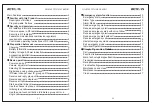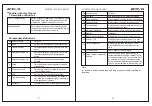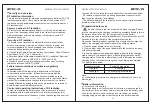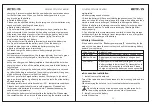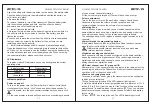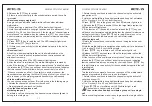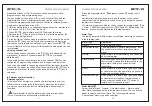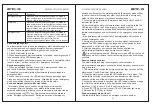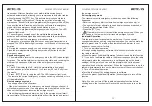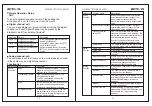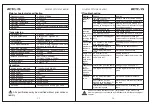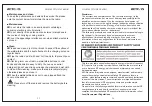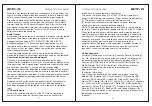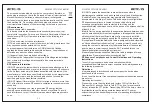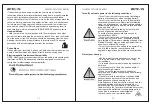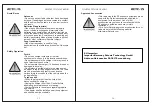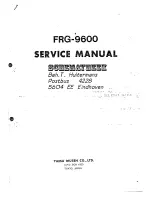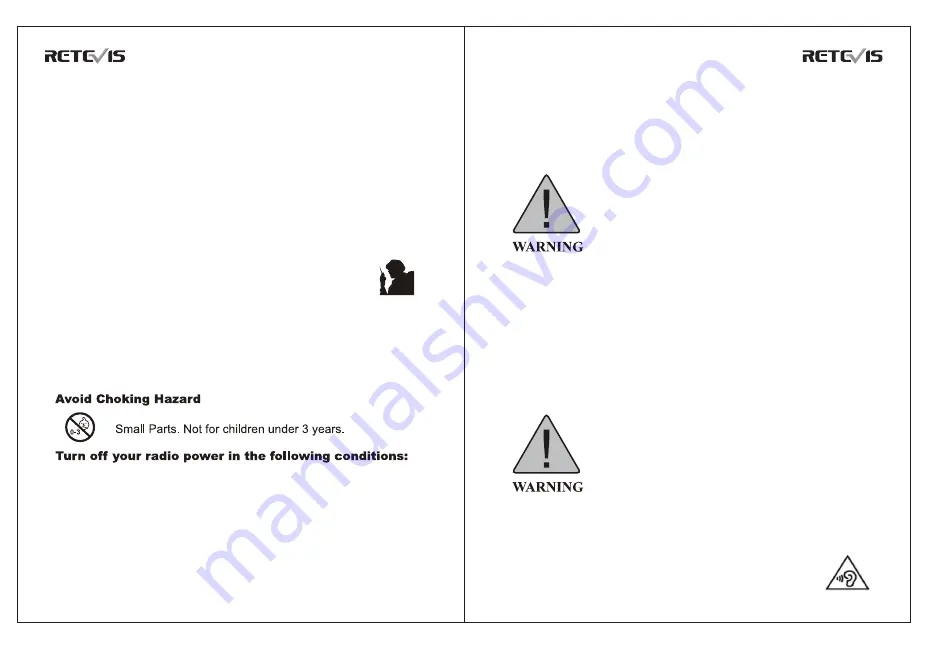
Disclaimer :
The accuracy and completeness of the contents are sought in the
process of compilation, but we do not bear any responsibility for the
possible errors or omissions. With the continuous development of
technology, we reserve the right to change the design and specification
of the product without notice. No copy, modification, translation and
dissemination of this handbook may be made in any form without the
prior written authorization of our department.
The third party products and contents involved in this manual belong to
the third party. Our company does not guarantee its accuracy,
effectiveness, timeliness, legality or integrity. If you need more
information or have any suggestions for this manual, welcome to our
website: http://www.retevis.com.
This two-way radio uses electromagnetic energy in the radio frequency
(RF) spectrum to provide communications between two or more users
over a distance.RF energy, which when used improperly, can cause
biological damage.
All Retevis two-way radios are designed, manufactured, and tested to
ensure they meet government-established RF exposure levels. In
addition, manufacturers also recommend specific operating instructions
to users of two-way radios. These instructions are important because
they inform users about RF energy exposure and provide simple
procedures on how to control it.
Please refer to the following websites for more information on what RF
energy exposure is and how to control your exposure to assure
compliance with established RF exposure limits:http://www.who.int/en/
LocalGovernment Regulations
When two-way radios are used as a consequence of employment, the
Local Government Regulations requires users to be fully aware of and
able to control their exposure to meet occupational requirements.
Exposure awareness can be facilitated by the use of a product label
directing users to specific user awareness information. Your Retevis
two-way radio has a RF Exposure Product Label. Also, your Retevis
user manual, or separate safety booklet includes information and
operating instructions required to control your RF exposure and to
satisfy compliance requirements.
Radio License
Governments keep the radios in classification, business two-way radios
operate on radio frequencies that are regulated by the local radio
management departments(FCC, ISED, OFCOM, ANFR, BFTK,
Bundesnetzagentur...).To transmit on these frequencies, you are
required to have a license issued by them. The detailed classification
and the use of your two radios, please contact the local government
radio management departments.
Use of this radio outside the country where it was intended to be
distributed is subject to government regulations and may be prohibited.
Unauthorized modification and adjustment
Changes or modifications not expressly approved by the party
responsible for compliance may void the user’s authority granted by the
local government radio management departments to operate this radio
and should not be made. To comply with the corresponding
requirements, transmitter adjustments should be made only by or under
the supervision of a person certified as technically qualified to perform
transmitter maintenance and repairs in the private land mobile and fixed
services as certified by an organization representative of the user of
those services.
Replacement of any transmitter component (crystal, semiconductor,
etc.) not authorized by the local government radio management
departments equipment authorization for this radio could violate the
rules.
FCCRequirements:
This device complies with part 15 of the FCC Rules. Operation is
subject to the condition that this device does not cause harmful
interference.(Licensed radios are applicable);
This device complies with part 15 of the FCC Rules. Operation is
subject to the following two conditions: (Other devices are applicable)
(1) This device may not cause harmful interference, and
(2) this device must accept any interference received, including
interference that may cause undesired operation.
NOTE: This equipment has been tested and found to comply with the
limits for a Class A digital device, pursuant to part 15 of the FCC Rules.
These limits are designed to provide reasonable protection against
harmful interference when the equipment is operated in a commercial
environment. This equipment generates, uses, and can radiate radio
frequency energy and, if not installed and used in accordance with the
instruction manual, may cause harmful interference to radio
communications. Operation of this equipment in a residential area is
likely to cause harmful interference in which case the user will be
required to correct the interference at his own expense.
CE Requirements:
•(Simple EU declaration of conformity) Shenzhen Retevis Technology
Co., Ltd. declares that the radio equipment typeis in compliance with
the essential requirements and other relevant provisions of RED
Directive 2014/53/EUand the ROHS Directive 2011/65/EU and the
WEEE Directive 2012/19/EU; the full text of the EU declaration of
conformity is available at the following internet address:
www.retevis.com.
•Restriction Information
This product can be used in EU countries and regions, including:
Belgium (BE), Bulgaria (BG), Czech Republic (CZ), Denmark (DK),
Germany (DE), Estonia (EE), Ireland (IE), Greece (EL), Spain (ES),
France (FR), Croatia (HR), Italy (IT), Cyprus (CY), Latvia (LV), Lithuania
(LT), Luxembourg (LU), Hungary (HU), Malta (MT), Netherlands (NL),
Austria (AT), Poland (PL), Portugal (PT), Romania (RO), Slovenia (SI),
Slovakia (SK), Finland (FI), Sweden (SE) and United Kingdom (UK).
For the warning information of the frequency restriction, please refer to
the package or manual section.
•Disposal
The crossed-out wheeled-bin symbol on your product, literature, or
packaging reminds you that in the European Union, all electrical and
electronic products, batteries, and accumulators (rechargeable
batteries) must be taken to designated collection locations at the end of
their working life. Do not dispose of these products as unsorted
municipal waste. Dispose of them according to the laws in your area.
ICRequirements:
Licence-exempt radio apparatus
This device contains licence-exempt transmitter(s)/receiver(s) that
comply with Innovation, Science and Economic Development Canada’s
licence-exempt RSS(s). Operation is subject to the following two
conditions:
(1) This device may not cause interference.
(2) This device must accept any interference, including interference that
may cause undesired operation of the device.
Le présent appareil est conforme aux CNR d’Industrie Canada
applicables aux appareils radio exempts de licence. L’exploitation est
autorisée aux deux conditions suivantes :
(1) l’appareil ne doit pas produire de brouillage;
(2) l’utilisateur de l’appareil doit accepter tout brouillage radioélectrique
subi, même si le brouillage est susceptible d’en compromettre le
fonctionnement.
RF Exposure Information
•DO NOT operate the radio without a proper antenna attached, as this
may damage the radio and may also cause you to exceed RF exposure
limits. A proper antenna is the antenna supplied with this radio by the
manufacturer or an antenna specifically authorized by the manufacturer
for use with this radio, and the antenna gain shall not exceed the
specified gain by the manufacturer declared.
•DO NOT transmit for more than 50% of total radio use time, more than
50% of the time can cause RF exposure compliance requirements to be
exceeded.
•During transmissions, your radio generates RF energy that can
possibly cause interference with other devices or systems. To avoid
such interference, turn off the radio in areas where signs are posted to
do so.
•DO NOT operate the transmitter in areas that are sensitive to
electromagnetic radiation such as hospitals, aircraft, and blasting sites.
•Portable Device, this transmitter may operate with the antenna(s)
documented in this filing in Push-to-Talk and body-worn configurations.
RF exposure compliance is limited to the specific belt-clip and
accessory configurations as documented in this filing and the
separation distance between user and the device or its antenna shall be
at least 2.5 cm.
•Mobile Device, during operation, the separation distance between user
and the antenna subjects to actual regulations, this separation distance
will ensure that there is sufficient distance from a properly installed
externally-mounted antenna to satisfy the RF exposure requirements.
•Occupational/Controlled Radio,this radio is designed for and classified
as “Occupational/Controlled Use Only”, meaning it must be used only
during the course of employment by individuals aware of the hazards,
and the ways to minimize such hazards; NOT intended for use in a
General population/uncontrolled environment.
•General population/uncontrolled Radio,this radio is designed for and
classified as “General population/uncontrolled Use”.
RF Exposure Compliance and Control Guidelines and Operating
Instructions
To control your exposure and ensure compliance with the
occupational/controlled environment exposure limits, always adhere to
the following procedures.
Guidelines:
•User awareness instructions should accompany the device when
transferred to other users.
•Do not use this device if the operational requirements described herein
are not met.
Operating Instructions:
•Transmit no more than the rated duty factor of 50% of the time. To
Transmit (Talk), push the Push to Talk (PTT) button. To receive calls
(listen), release the PTT button. Transmitting 50% of the time, or less, is
important because the radio generates measurable RF energy
exposure only when transmitting in terms of measuring for standards
compliance.
DIGITAL TWO WAY RADIO
DIGITAL TWO WAY RADIO
•Transmit only when people outside the vehicle are at least the
recommended minimum lateral distance away from a properly installed
according to installation instructions, externally mounted antenna.
•When operating in front of the face, worn on the body, always place the
radio in a Retevis approved clip, holder, holster, case, or body harness
for this product. Using approved body-worn accessories is important
because the use of Non-Retevis approved accessories may result in
exposure levels, which exceed the IEEE/ICNIRP RF exposure limits.
Hand-held Mode
• Hold the radio in a vertical position with the microphone (and other
parts of the radio including the antenna) at least 2.5 cm (one inch) away
from the nose or lips. The antenna should be kept away from the eyes.
Keeping the radio at a proper distance is important as RF exposure
decreases with increasing distance from the antenna.
Phone Mode
•When placing or receiving a phone call, hold your radio product as you
would a wireless telephone. Speak directly into the microphone.
Electromagnetic Interference/Compatibility
NOTE: Nearly every electronic device is susceptible to electromagnetic
interference (EMI) if inadequately shielded, designed, or otherwise
configured for electromagnetic compatibility.
•Turn off your radio before removing (installing) a
battery or accessory or when charging battery.
•Turn off your radio when you are in a potentially
hazardous environments: Near electrical blasting
caps, in a blasting area, in explosive atmospheres
(inflammable gas, dust particles, metallic powders,
grain powders, etc.).
•Turn off your radiowhile taking on fuel or while
parked at gasoline service stations.
To avoid electromagnetic interference and/or
compatibility conflicts
•Turn off your radio in any facility where posted
notices instruct you to do so, hospitals or health
care facilities (Pacemakers, Hearing Aids and Other
Medical Devices) may be using equipment that is
sensitive to external RF energy.
•Turn off your radio when on board an aircraft. Any
use of a radio must be in accordance with
applicable regulations per airline crew instructions.
Use the lowest volume necessary to do your job.
• Turn up the volume only if you are in noisy
surroundings.
• Turn down the volume before adding headset or
earpiece.
• Limit the amount of time you use headsets or
earpieces at high volume.
• When using the radio without a headset or
earpiece, do not place the radio's speaker directly
against your ear
• Use careful with the earphone maybe possible
excessive sound pressure from earphones and
headphones can cause hearing loss
Note:Exposure to loud noises from any source for
extended periods of time may temporarily or
permanently affect your hearing. The louder the
radio's volume, the less time is required before your
hearing could be affected. Hearing damage from
loud noise is sometimes undetectable at
first and can have a cumulative effect.
Turn off your radio power in the following conditions:
Protect your hearing:
31
32

